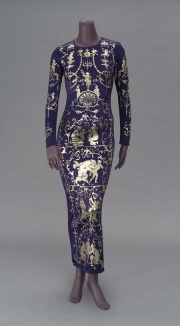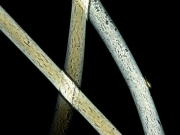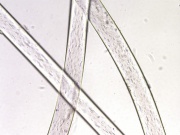Difference between revisions of "Lycra"
Jump to navigation
Jump to search
| Line 37: | Line 37: | ||
== Sources Checked for Data in Record == | == Sources Checked for Data in Record == | ||
| − | * | + | * Rosalie Rosso King, ''Textile Identification, Conservation, and Preservation'', Noyes Publications, Park Ridge, NJ, 1985 |
| − | * | + | * Marjory L. Joseph, ''Introductory Textile Science'', Holt, Rinehart and Winston, Fort Worth, TX, 1986 |
| − | * | + | * Thomas Gregory, ''The Condensed Chemical Dictionary'', Reinhold Publishing, New York, 3rd ed., 1942 |
* ''The American Heritage Dictionary'' or ''Encarta'', via Microsoft Bookshelf 98, Microsoft Corp., 1998 | * ''The American Heritage Dictionary'' or ''Encarta'', via Microsoft Bookshelf 98, Microsoft Corp., 1998 | ||
| − | * | + | * Website address 1 Comment: www.astm.org |
[[Category:Materials database]] | [[Category:Materials database]] | ||
Revision as of 17:14, 20 May 2020
Description
[Invista, formerly DuPont Textiles] A registered trademark for a spandex (Polyurethane) fiber that is produced as a continuous filament. Lycra was introduced in 1959. It is available in a wide range of yarn sizes with denier from 40-2240. It has excellent stretch and recovery properties and is one of the most durable elastic fibers available. Lycra is used for girdles, swimwear, surgical hose, and athletic clothes. Chlorine in swimming pools can cause slow degradation of the fibers.
Synonyms and Related Terms
spandex; licra (Esp.); Lycra (Ned);
Applications
Risks
Combustible, but self-extinguishing.
Physical and Chemical Properties
- Soluble in hot dimethyl formamide.
- Moisture regain = 0.3%
- Elongation 500-700%.
- Cross section = round and fused at random points.
- Melting Point = 230 C
Additional Information
Lycra: Website
Comparisons
Properties of Synthetic Fibers
Sources Checked for Data in Record
- Rosalie Rosso King, Textile Identification, Conservation, and Preservation, Noyes Publications, Park Ridge, NJ, 1985
- Marjory L. Joseph, Introductory Textile Science, Holt, Rinehart and Winston, Fort Worth, TX, 1986
- Thomas Gregory, The Condensed Chemical Dictionary, Reinhold Publishing, New York, 3rd ed., 1942
- The American Heritage Dictionary or Encarta, via Microsoft Bookshelf 98, Microsoft Corp., 1998
- Website address 1 Comment: www.astm.org


